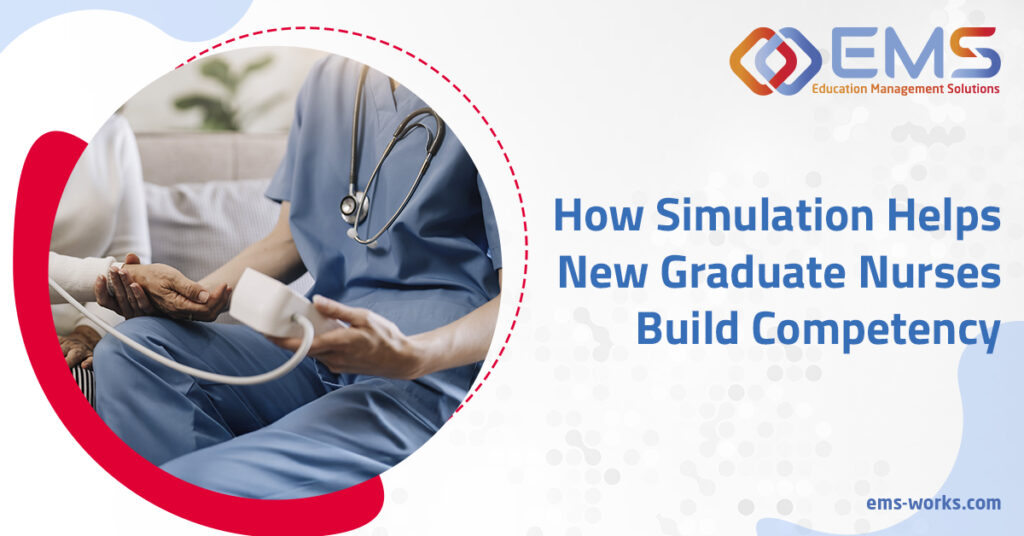Transitioning from nursing school to clinical practice is one of the most challenging phases in a nurse’s career. For new graduate nurses (NGNs), the first year in practice often determines whether or not they thrive in the profession. Simulation-based learning has emerged as a transformative tool during this critical transition, providing NGNs with the skills, confidence, and competency necessary for success.
In this blog post, we’ll explore how simulation helps NGNs navigate residency programs and become effective contributors to patient care teams.
Understanding the Challenges of Transitioning to Practice
The transition from academia to clinical practice is an intense experience for NGNs; essentially a “make or break” period in their professional development. Without adequate support, NGNs may feel overwhelmed and burned out. This can result in potential practitioners leaving the profession altogether.
The primary challenges NGNs may face in this transitionary period include:
- Interpersonal Dynamics: NGNs often struggle to build effective relationships with colleagues, nurses, and physicians. Poor communication skills can undermine collaboration and teamwork.
- Skill Gaps: While NGNs graduate with the foundational knowledge needed to pass the NCLEX, many enter specialized areas (e.g., emergency medicine, obstetrics, pediatrics) where extensive hands-on training is critical.
- Confidence Deficits: NGNs often lack confidence in their ability to handle high-pressure scenarios, complex procedures, or difficult patient interactions.
One solution educators and healthcare systems are relying on to ease this transition is simulation. By leveraging advanced simulation solutions, institutions can address the critical gaps in clinical readiness, empowering new graduate nurses to transition seamlessly from academic training to real-world practice while improving competence, confidence, and overall patient care outcomes.
How Simulation Strengthens NGNs During Residency Programs
Here are the key ways simulation enriches NGN training during residency:
- Building Communication and Teamwork Skills
Effective communication is one of the most crucial skills for NGNs. Simulation can help reinforce the skills needed to prepare NGNs with communication frameworks to speak effectively with doctors, advanced practice providers, and patients.
Simulation provides:
- Practice In Safe Environments: NGNs can practice voicing concerns, sharing critical information with teams, and navigating difficult interactions without fear of judgment.
- Quality Debrief and Feedback: Simulations often include structured debriefings, where misconceptions, strengths, and areas for improvement are addressed.
These exercises help NGNs gain confidence in their interpersonal relationships and establish the skills required for effective teamwork, enhancing workplace collaboration.
- Mastering Low-Frequency, High-Intensity Events
During residency, NGNs may encounter rare but critical patient situations, such as cardiac arrests, deteriorating patients, or obstetric emergencies. Simulations are especially useful for practicing high-acuity, low-frequency scenarios that may not be encountered for years but require mastery.
Simulation provides:
- Exposure to Critical Scenarios: Mock codes, deteriorating patient drills, and obstetrical emergencies such as postpartum hemorrhages or shoulder dystocia can be simulated to ensure NGNs are prepared.
- Hands-On Application of Skills: Simulations provide NGNs the opportunity to practice technical skills and develop muscle memory in stress-free settings.
By practicing these scenarios in controlled environments, NGNs enhance their preparedness to handle these situations in real-world settings.
- Standardizing Skill Levels Across Diverse Backgrounds
NGNs entering the workforce often have varied clinical skills depending on their educational experiences. Simulation bridges these gaps, especially in contexts where hands-on clinical opportunities are inconsistent or limited.
Simulation provides:
- Uniform Standards: NGNs undergo standardized scenarios that assess their readiness and ensure all new hires begin at a common baseline.
- Competency Validation: Organizations can use simulation to ensure every clinician is equipped with vital knowledge and skills before they start caring for patients.
Simulation can create equity in nursing education, ensuring everyone meets the same high standard regardless of their varied backgrounds.
- Building Confidence Through Repetition and Feedback
Confidence in clinical skills is often the missing puzzle piece for NGNs. Simulation can make “content come alive,” allowing NGNs to transition beyond classroom learning by putting their knowledge into practice.
Simulation provides:
- Real-Time Feedback: Repeated exposure to patient scenarios helps NGNs refine their skills with feedback from trainers or peers.
- Opportunities to Try Again: For NGNs struggling with certain tasks, simulation provides safe opportunities to repeat scenarios until mastery is achieved.
This iterative process helps NGNs not only master competencies but feel confident to apply them under pressure.
- Orientation to Workflows, Systems, and Policies
Beyond clinical skills, NGNs need to learn how their hospital systems function. Simulation can help familiarize NGNs with their work environments, including where equipment is located, how to call for help, and procedural workflows.
Simulation provides:
- Operational Knowledge: NGNs learn practical details such as medication device locations and care pathways.
- Confidence in Workflows: Standardized teaching via simulation alleviates uncertainty, ensuring new nurses can navigate systems seamlessly.
This reduces emotional overload during their first weeks on the job and sets NGNs up for operational success.
The Future Success of New Graduate Nurses is Tied to Simulation
Simulation training has the power to transform nurse residency programs by providing NGNs with critical skills, confidence, and readiness to face clinical challenges. More than just technical training, simulation ensures NGNs develop communication, teamwork, and systems knowledge—all in safe, structured environments that reduce burnout and increase retention.
For healthcare institutions, the message is clear: Investing in simulation isn’t just an innovative idea—it’s a necessary strategy to ensure the future of nursing. If you’re interested in seeing how simulation solutions can transform your nursing program, contact an EMS solutions expert to schedule a discussion.

